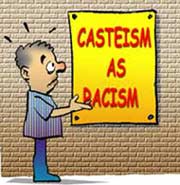Casteism
as racism:
anthropologically sound?

While Dalit organisations are making a strong case for a UN endorsement
of the definition of casteism as racism, anthropologists are worried about
the implications of such a definition - they say that while both concepts
are based on discrimination, the caste system is not based on race and
physical attributes, says Rinku Pegu
The effort by various Dalit organisations to redefine the caste system as a form of racism and get the redefinition endorsed by the United Nations (UN) has opened a Pandora's box of anthropological controversy. While the government has opposed the whole concept as unjustifiable, it has been hijacked out of the ambit of anthropology and into the political arena: the broad political opinion is opposed to the notion of caste and racism being kissing cousins, ostensibly for fear of getting India a questionable reputation.
Anand B Bardhan,
general secretary of the Communist Party of India (CPI), does not agree
with the above contention. "My reading of the caste system is that it
cannot be equated with racism. I agree that both are concepts based on
discrimination, but racism has to
do with physical attributes, unlike the caste system,"
he says.
Bardhan expresses his scepticism about any caste specific activity by
UN by saying that "even if caste is equated with racism, can you run away
from the fact? Even if it is recognised by UN, it will only mean endless
debate without achieving anything fruitful.
Politicians argue
that the caste system cannot be a
form of racism, because it exists only in India. (It doesn't - it is also
prevalent in the entire South Asian region, including Bangladesh and Nepal.)
|
BSP leader Arif M Khan says the issue of Dalits is not about names and renaming "but about discrimination" |
Noted writer Rajendra
Yadav says that the "discriminatory caste system" is equivalent to racism
"as it is based on notions that some people are superior and others inferior".
Arguing for recognition
of the Dalit cause by the UN,
Paul Diwakar, convenor of the National Campaign on
Dalit Human Rights, explains that the term "descent" used in Article 1
of the Convention of the UN against Racism does not solely refer to race.
The question is -
does the present reality add up to a damning case against caste? Weighed
in terms of the benefits that freedom brought Indians, the Dalits are
still a deprived community in India.
Bardhan says - anthropologists
would say simplistically - that the claim of the Brahmin caste that it
belongs to the Aryan race has been disproved by the fact that most South
Indian Brahmins belong to the Dravidian race.
He points out that
even B R Ambedkar, the most prominent Dalit leader and crusader, refrained
from equating caste with race in his definitive analysis of the caste
system. "Do you mean to say that all the various castes belong to different
races?" asks Bardhan.
The Congress, on its part, is yet to decide on the issue. Congress spokesperson
Jaipal Reddy explains the absence of an official view on the issue saying,
"Unless
it is electorally imperative, we will not take up the issue." When pressed
further, he admitted, "Sensitivity to such issues is limited to electoral
pressures."
Bahujan Samaj Party
(BSP) leader Arif M Khan says
that the issue of Dalits is not about names and renaming "but about discrimination".
Khan points to the fact that the emancipation of Dalits from oppressive
social stigma remains a distant dream. The most important concern is the
lack of avenues for upward mobility for most of the 160 million Dalits
in the country.
The word Dalit is
Marathi for "crushed". Social activist Madhu Kishwar says, "I do not have
any problems
about whatever name Dalits are called, so long as it brings them out of
their oppressive condition." Kishwar believes that the greatest barrier
to the development of Dalits is the English language, which, she says,
is "the new caste system" that is depriving the non-English
speaking people.
Legislations which are meant to protect Dalits, like the Prevention of
Atrocities against the Scheduled Castes and Tribes, are rarely implemented,
says Diwakar.